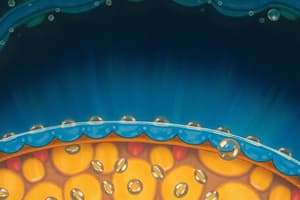Podcast
Questions and Answers
What is the term for the process by which large particles are engulfed by the cell membrane?
What is the term for the process by which large particles are engulfed by the cell membrane?
- Pinocytosis
- Diffusion
- Phagocytosis (correct)
- Exocytosis
Which type of solution causes a cell to swell due to the influx of water?
Which type of solution causes a cell to swell due to the influx of water?
- Isotonic solution
- Saturated solution
- Hypotonic solution (correct)
- Hypertonic solution
What role do cholesterol molecules play in the cell membrane?
What role do cholesterol molecules play in the cell membrane?
- They act as energy storage.
- They provide rigidity and stabilize the membrane's fluidity. (correct)
- They facilitate the transport of ions.
- They serve as receptors for signaling molecules.
What is the primary difference between passive transport and active transport?
What is the primary difference between passive transport and active transport?
Which process actively pumps ions across the cell membrane?
Which process actively pumps ions across the cell membrane?
Flashcards are hidden until you start studying
Study Notes
Cell Membrane Processes
- Phagocytosis allows large particles to be engulfed by the cell membrane.
- Other processes related to cell membrane activity include exocytosis (release of substances), and pinocytosis (cell drinking).
Solutions and Cell Behavior
- A hypotonic solution causes a cell to swell as water influx increases.
- Isotonic solutions have equal concentrations inside and outside the cell, preventing swelling or shrinking.
- Hypertonic solutions lead to cell shrinkage due to water moving out.
Cholesterol's Role in Cell Membrane
- Cholesterol molecules provide rigidity and stabilize the fluidity of the cell membrane.
- They do not primarily serve as energy storage, transport facilitators, or receptors.
Transport Mechanisms
- Passive transport moves substances down their concentration gradient without requiring energy.
- Active transport requires energy to move substances against their concentration gradient.
- Key distinction: passive transport is energy-free, while active transport demands energy input.
Studying That Suits You
Use AI to generate personalized quizzes and flashcards to suit your learning preferences.




